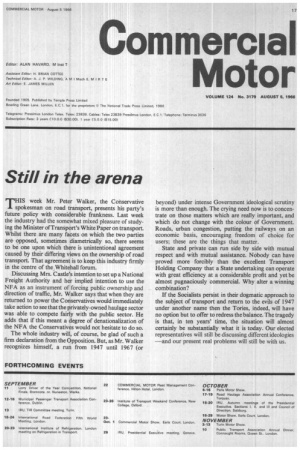Still in the arena
Page 19

If you've noticed an error in this article please click here to report it so we can fix it.
THIS week Mr. Peter Walker, the Conservative spokesman on road transport, presents his party's future policy with considerable frankness. Last week the industry had the somewhat mixed pleasure of studying the Minister of Transport's White Paper on transport. Whilst there are many facets on which the two parties are opposed, sometimes diametrically so, there seems to be one upon which there is unintentional agreement caused by their differing views on the ownership of road transport. That agreement l is to keep this industry firmly in the centre of the Whitehall forum.
Discussing Mrs. Castle's intention to set up a National Freight Authority and her implied intention to use the NFA as an instrument of forcing public ownership and direction of traffic, Mr. Walker says that when they are returned to power the Conservatives would immediately take action to see that the privately-owned haulage sector was able to compete fairly with the public sector. He adds that if this meant a degree of denationalization of the NFA the Conservatives would not hesitate to do so.
The whole industry will, of course, be glad of such a firm declaration from the Opposition. But, as Mr. Walker recognizes himself, a run from 1947 until 1967 (or beyond) under intense Government ideological scrutiny is more 'than enough. The crying need now is to concentrate on those matters which are really important, and which do not change with the colour of Government. Roads, urban congestion, putting the railways on an economic basis, encouraging freedom of choice for users; these are the things that matter.
State and private can run side by side with mutual respect and with mutual assistance. Nobody can have proved more forcibly than the excellent Transport Holding Company that a State undertaking can operate with great efficiency at a considerable profit and yet be almost pugnaciously commercial. Why alter a winning combination?
If the Socialists persist in their dogmatic approach to the subject of transport and return to the evils of 1947 under another name then the Tories, indeed, will have no option but to offer to redress the balance. The tragedy is that, in ten years' time, the situation will almost certainly be substantially what it is today. Our elected representatives will still be discussing different ideologies and our present real problems will still be with us.
















































































































